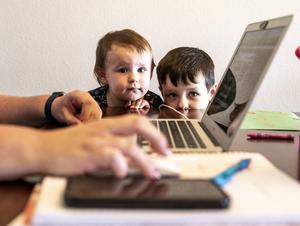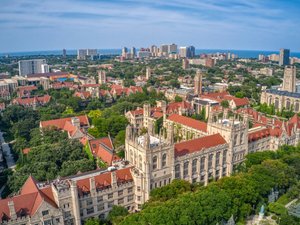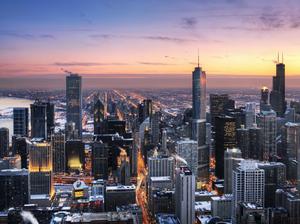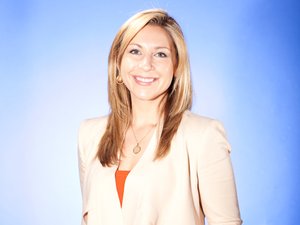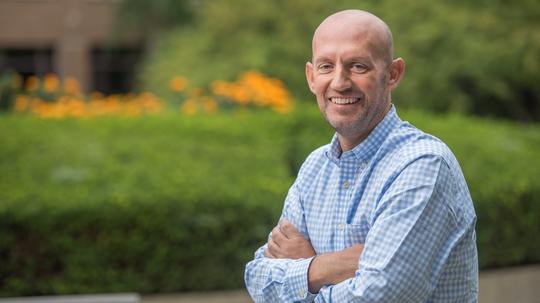
When longtime Accenture employee Lee Moore accepted a big promotion to run the company’s Midwest operations, he had no idea that he’d be leading a team of 11,000 people during one of the worst pandemics in recent history and a painful cultural movement around racial injustice.
Moore, who started his career at Accenture nearly 30 years ago as a consultant in London, assumed his new role as the company’s Midwest market unit lead on March 1. Ten days later, he was ordering every employee in the region to work from home, and navigating the complexities of transitioning an enormous team—accustomed to working in an office—to working remotely indefinitely.
“Life was thrown up in the air three months ago,” Moore said during an interview from his Lincoln Park home in early June. “Even though we knew what was happening around the rest of the world, when it happened here, it happened very quickly.”
Moore last traveled for business during the second week of March when he returned to Chicago from a trip to Minneapolis. Shortly after he got off the plane, he devised a work-from-home plan for his team.
“People went through a phase of feeling fairly scared,” Moore said. “They didn’t quite know what was going on in the external world. And they were looking to me and the organization for trusted information and trusted guidance.

“We put in place very structured, effective crises management processes, both globally and locally,” Moore continued. “It feels like we’ve had three years of transformation in three months.”
Accenture has been tracking the number of employees who have contracted Covid-19, but declined to share specific numbers on how many had it.
The consulting giant is one of Chicago’s larger employers. Of the 11,000 people it employs throughout the Midwest, 6,200 of them are in the Windy City office, which is led by Jim Coleman. Accenture works with 95 of the Fortune 100 and more than 70% of the Fortune 500. Some of its local clients include McDonald's and Exelon.
Accenture has also been active in Chicago’s startup scene, working with tech hubs like 1871, MATTER and mHub. It also contributes to P33, an initiative spearheaded by Penny Pritzker and Chris Gladwin to turn Chicago into a top-tier tech hub.
The transition to remote work
Besides making sure every employee had access to tech equipment and business software at home, Moore was tasked with keeping team members engaged during this period of remote work.
Like many other companies, Accenture has leaned heavily on video call services. Using Microsoft Teams, the firm created virtual water coolers and town halls to keep employees connected from a distance. Since the pandemic began, Accenture has grown its video usage by 500%, Moore said.
“We’ve used that channel to really build community,” Moore said. “We’ve used the technology and really pushed it to its limits.”
Besides work-related video calls, Accenture is also hosting weekly virtual Zumba and yoga classes for employees, as well as TikTok and baking competitions.
To connect with his team during the pandemic, Moore filmed video blogs, where he shared details about what it’s like working from home and what his family does for fun.

“I wanted people to connect with me,” Moore said. “Bringing that personal side to the discussion with my team—with 11,000 people—has also helped them to realize it’s OK to take a walk at 4 p.m. with your family. It’s OK to have the kids in the background when you’re on a video call.”
At the beginning of May, Accenture hosted a three-day virtual event around mental health, educating employees on how to prioritize their mental wellbeing, identify issues with it and take advantage of the company’s healthcare benefits.
Despite the economic turmoil that the Covid-19 crisis has brought with it, Accenture says its business remains strong. The company is still moving forward with plans to build out a seven-floor office at 500 W. Madison St. and naming the building Accenture Tower. Employees are expected to begin working out of the new building in 2022. The tower is already home to Accenture’s innovation hub, which opened in 2016 and is used to connect clients with tech-forward solutions and startups.
As of late, much of Accenture’s work has focused on helping clients pivot to surviving a challenging economy, as well as preparing for office returns.
“The one thing that is certain is that uncertainty is going to continue for the next 12 or 18 months,” Moore said. “So how are they going to run their business in the new world? How are they going to out-maneuver uncertainty to reinvent their business? There’s not a CEO out there that doesn’t believe they need to be more agile than they’ve ever been.”
A different kind of crisis
Right about the time society began understanding how to deal with the Covid crisis, a different kind of crisis hit the U.S. Issues surrounding systemic racism, racial injustice and police brutality were reignited after the death of George Floyd, an unarmed Black man who died in police custody in Minneapolis.
Floyd’s death and ensuing protests in every single state forced many companies to speak out about the Black Lives Matter movement and where they stood on issues of racial justice. And Accenture was no exception.
The company addressed its employees and the public soon after Floyd’s death, saying it stood with and empathizes with Black Americans, and is committed to diversifying its company. To help keep the conversation going, Moore organized a virtual event where Accenture employees were invited to share their feelings and experiences as it related to systemic racism in America.
"It feels like we’ve had three years of transformation in three months.”
“It’s devastating,” Moore said. “But you’ve got to create an environment where you really want everyone to show up and speak up.”
At first, the event included just employees from Accenture’s Chicago team, but ended up growing throughout the course of the day. Before the event was over, Accenture employees from all over the country had tuned in, Moore said.
“That call started off as a couple hours and ended up going for 11 hours,” Moore said. “It was just so emotional, and quickly enabled people to focus on what they felt we could do about it as an organization and as individuals.”
Accenture has Black and LatinX resource groups that help the company hire, retain and nurture diverse talent, Moore said. For the second consecutive year, Accenture was named the world’s most diverse and inclusive company in 2019 by financial market data firm Refinitiv.
A 'year of surprises'
After navigating the Covid crisis and Floyd's tragic death, Moore is now beginning to focus on what his job description originally entailed. That includes managing clients and closely monitoring the company’s financial performance.
He is also concentrating on the safest way to bring his team back into the office.
“Slowly and gradually is the main principle,” Moore said. “We’re going to be very focused on what our clients want.”
At the beginning of June, some local Accenture employees, such as its internal technology team, returned to the office, Moore said. Others will return in phases, though most are still working from home at this time.
When asked if he was looking forward to things getting back to normal, Moore laughed.
“I was on a client call just before this one and we were talking about the cyclone that just went through Mumbai in India," he said. “So, I think 2020 is the year of surprises.”
